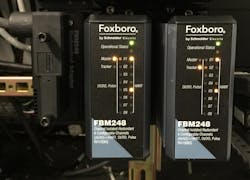Answering the continued call for a significant change in how production automation is approached, Schneider Electric has updated capabilities for its universal I/O, introducing redundancy to its Foxboro Intelligent Marshalling offering and adding universal I/O to its Tricon CX compact safety system.
In a keynote speech at Connect 2016, the Schneider Electric automation conference going on this week in New Orleans, Sandy Vasser, senior adviser for ExxonMobil Production Co., reiterated his push for vendors to rethink traditional automation technologies. Much of the change that Vasser advocates hinges on smart, configurable I/O, and all the key automation providers have been rolling out some form of universal I/O, geared toward greater flexibility for I/O changes as projects near completion.
Schneider Electric’s universal I/O, branded as Intelligent Marshalling, has been on the market for about four years, introduced with the FBM247 software-configurable I/O module. Benefits that it achieved early on included no trips to the field to make changes, faster implementation and startup, reduced equipment costs and footprint, reduced spares and inventory, and reduced engineering and documentation, noted Thad Frost, technology manager, I/O and field connectivity, for Schneider.
Hearing from customers that they needed to do more in less real estate, Schneider last year launched the Compact 200 Series I/O, adding universal I/O on top of that family.
Today’s announcement comes in response to customers’ need for redundancy, providing maximum uptime and maximum reliability, Frost said. The Foxboro Evo FBM248 introduces redundancy capabilities to Intelligent Marshalling.
Schneider Electric also announced Safety Intelligent Marshalling for Tricon CX. The compact safety system has been enhanced with the addition of the 3902X TMR universal I/O module.
Upgrading the Intelligent Marshalling system to include redundancy and safety capabilities provides improvements customers need in safety, reliability and efficiency of their plants and business operations, said Chris Lyden, senior vice president of strategy, process automation, for Schneider Electric. “Configuring control and safety systems I/O can be costly, labor-intensive and subject to change,” he said. “With their additional flexibility, the Foxboro FBM248 and Tricon CX 3902X I/O offerings allow our customers to adjust to unforeseen module changes and errors with little impact to installation time.”
Universal I/O translates into huge savings in project execution and operations. Several suppliers have been working on what Vasser refers to as taking automation off the critical path, enabling concurrent automation development and eliminating the need for factory automation testing (FAT).
With this technology, Schneider has made a significant impact on its own costs, Lyden said. “But what this really helps is our customers’ costs,” he added. “They get the time to first oil, or whatever they produce, sooner.” Just eliminating the FAT alone takes out a huge amount of cost, he also noted in a separate conversation.
Cost savings also come from the reduction in the cabinet space needed that software-configurable I/O enables. “What we took a beating on a few years ago was the number of cabinets we had to supply on a project,” Lyden said. “Now we’re shipping about 60 percent of the cabinets we had to a few years ago. This is a huge cost savings.”
Frost likened ordering an intelligent enclosure from Schneider Electric like going to McDonald’s and ordering small, medium or large. “If you said, ‘I want a medium safety intelligent enclosure,’ we’d know exactly what you need,” he said. “It could go directly to the site, bypassing the FAT.”
It breaks the dependency between the I/O system design and I/O system installation, Frost added, enabling shipping and installation immediately, with configuration later. “We’re pretty excited about it,” he said. “We feel like we’ve got a complete solution being able to drop ship cabinets.”
Lyden emphasized all the work that Schneider Electric has been doing to get man-hours out of production as a key way to save costs. “We’re not just launching I/O boards here. We’re trying to build an entire approach to projects,” he said. “We’re getting man hours out, shortening the project time, and hopefully making it safer on site as well.”
About the Author
Aaron Hand
Editor-in-Chief, ProFood World

Leaders relevant to this article:
